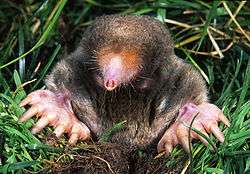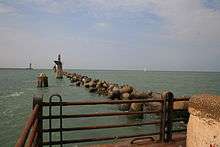Definify.com
Webster 1913 Edition
Mole
Mole
,Mole
,Mole
,Mole
,Webster 1828 Edition
Mole
MOLE
, n.MOLE
,MOLE
,MOLE
,Definition 2026
Mole
mole
mole
English
Pronunciation
- (UK) IPA(key): /məʊl/, /mɔʊl/
- (Estuary English) IPA(key): /mɒʊl/
- (US) IPA(key): /mol/, /moʊl/
- Rhymes: -əʊl
Noun
mole (plural moles)

Synonyms
Related terms
Translations
|
|
Etymology 2
From Middle English mol, molde, molle, from Old English *mol, from Proto-Germanic *mulaz, *mulhaz (“mole, salamander”), from Proto-Indo-European *molg-, *molk- (“slug, salamander”), from Proto-Indo-European *(s)melw- (“to grind, crush, beat”). Cognate with North Frisian mull (“mole”), Saterland Frisian molle (“mole”), Dutch mol (“mole”), Low German Mol, Mul (“mole”), German Molch (“salamander, newt”), Old Russian смолжь (smolžʹ, “snail”), Czech mlž (“clam”).
Derivation as an abbreviation of Middle English molewarpe, a variation of moldewarpe, moldwerp (“mole”) in Middle English is unexplained and probably unlikely due to the simultaneous occurrence of both words. See mouldwarp.
Alternative forms
Pronunciation
- (UK) IPA(key): /məʊl/
- (Estuary English) IPA(key): /mɒʊl/
- (US) IPA(key): /mol/, /moʊl/
- Rhymes: -əʊl
Noun
mole (plural moles)


- Any of several small, burrowing insectivores of the family Talpidae.
- Any of the burrowing rodents also called mole rats.
- (espionage) An internal spy, a person who involves himself or herself with an enemy organisation, especially an intelligence or governmental organisation, to determine and betray its secrets from within.
- A kind of self-propelled excavator used to form underground drains, or to clear underground pipelines
- A type of underground drain used in farm fields, in which a mole plow creates an unlined channel through clay subsoil.
Derived terms
|
Synonyms
Translations
|
|
Etymology 3
From moll (from Moll, an archaic nickname for Mary), influenced by the spelling of the word mole (“an internal spy”), and due to /mɒl/ and /məʊl/ merging as [moʊl] in the Australian accent.
Pronunciation
- (Australia) IPA(key): /moʊl/
- Rhymes: -əʊl
Noun
mole (plural moles)
Synonyms
Translations
Etymology 4
French môle or Latin mōles (“mass, heap, rock”).

Pronunciation
Noun
mole (plural moles)
- (nautical) A massive structure, usually of stone, used as a pier, breakwater or junction between places separated by water.[1]
- 1847 — George A. Fisk, A pastor's memorial of the holy land
- [Alexander the Great] then conceived the stupendous idea of constructing a mole, which should at once connect [Tyre] with the main land; and this was actually accomplished by driving piles and pouring in incalculable quantities of soil and fragments of rock; and it is generally believed, partly on the authority of ancient authors, that the whole ruins of Old Tyre were absorbed in this vast enterprize, and buried in the depths of the sea [...]
- 1983 — Archibald Lyall, Arthur Norman Brangham, The companion guide to the south of France
- [about Saint-Tropez] Yachts and fishing boats fill the little square of water, which is surrounded on two sides by quays, on the third by a small ship-repairing yard and on the fourth by the mole where the fishing boats moor and the nets are spread out to dry.
- 1847 — George A. Fisk, A pastor's memorial of the holy land
- (rare) A haven or harbour, protected with such a breakwater.
Translations
Etymology 5
Alternative forms
- mol (dated)
Pronunciation
Noun
mole (plural moles)
- (chemistry, physics) In the International System of Units, the base unit of amount of substance; the amount of substance of a system which contains as many elementary entities (atoms, ions, molecules, etc.) as there are atoms in 0.012 kg of carbon-12. Symbol: mol. The number of atoms is known as Avogadro’s number. [from 1897]
Synonyms
Translations
Etymology 6
Pronunciation
Noun
mole (plural moles)
- A hemorrhagic mass of tissue in the uterus caused by a dead ovum.
Translations
Etymology 7
From Spanish, from Nahuatl mōlli (“sauce; stew; something ground”).
Pronunciation
- (US) IPA(key): /ˈmoʊleɪ/, /ˈmoʊli/
Noun
mole (plural moles)
- One of several spicy sauces typical of the cuisine of Mexico and neighboring Central America, especially the sauce which contains chocolate and which is used in cooking main dishes, not desserts.[2]
Translations
References
Anagrams
Danish
Pronunciation
- IPA(key): /moːlə/, [ˈmoːlə]
Noun
mole c (singular definite molen, plural indefinite moler)
Inflection
Latin
Etymology 1
Verb
mole
- second-person singular present active imperative of molō
Etymology 2
Noun
mōle f
- ablative singular of mōles
Portuguese
Pronunciation
- (Portugal) IPA(key): /ˈmɔ.lɨ/
- (Brazil) IPA(key): /ˈmɔ.li/
- (South Brazil) IPA(key): /ˈmɔ.le/
- Hyphenation: mo‧le
Etymology 1
From Old Portuguese mole, from Latin mollis, earlier *molduis, from Proto-Indo-European *(h₂)moldus (“soft, weak”).
Adjective
mole m, f (plural moles, comparable)
Inflection
| singular | plural | |||
|---|---|---|---|---|
| masculine | feminine | masculine | feminine | |
| positive | mole | mole | moles | moles |
| comparative | mais mole | mais mole | mais moles | mais moles |
| superlative | o mais mole molíssimo |
a mais mole molíssima |
os mais moles molíssimos |
as mais moles molíssimas |
| augmentative | molão | molona | molões | molonas |
| diminutive | molinho | molinha | molinhos | molinhas |
Etymology 2
Noun
mole f (plural moles)
Etymology 3
Noun
mole m (plural moles)
Spanish
Etymology 1
From Latin mollis; cognate with muelle.
Adjective
mole m, f (plural moles)
Synonyms
Etymology 2
From Latin moles
Noun
mole f (plural moles)
Etymology 3
From Classical Nahuatl mōlli (“sauce, something ground”).
Noun
mole m (plural moles)
- (Mexico) mole, a type of stew.
Etymology 4
Verb
mole
- Formal second-person singular (usted) imperative form of molar.
- First-person singular (yo) present subjunctive form of molar.
- Formal second-person singular (usted) present subjunctive form of molar.
- Third-person singular (él, ella, also used with usted?) present subjunctive form of molar.
Zayse-Zergulla
Noun
mole
References
- Etymological Dictionary of Egyptian: M- (2007), page 397 (Zayse mo'le)
- Linda Jordan, A study of Shara and related Ometo speech varieties (Zergulla mòlɛ́)